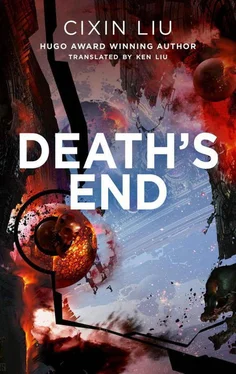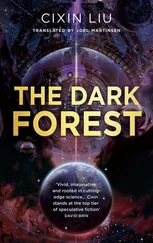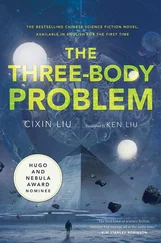Regrettably, there was only one Gravity .
There were two reasons that more ships with transmitters weren’t built: First, there was the “Sons of the Earth” attack on the transmitter in Antarctica. Spaceships were deemed even more vulnerable to threats from extremist humans than underground stations. Second, it was a matter of economics. Since gravitational wave antennas were immense, they had to serve as the hull of the ship itself. Thus, the antenna had to be constructed out of materials that met the requirements of spaceflight, which increased costs many times. Gravity itself cost almost the equivalent of the twenty-three ground-based transmitters added together. Moreover, the hull of the ship itself could not be refreshed; when the vibrating string made of degenerate matter that ran the length of the ship reached its fifty-year half-life limit, a completely new gravitational wave ship had to be built.
But the deeper root cause could only be found in the minds of humankind. Never explicitly stated, and perhaps not even consciously understood, a gravitational wave ship was too powerful—so powerful that it terrified its creator. If something—a droplet attack or something else—forced such ships to depart for deep space, and they could never return to the Solar System due to the presence of enemy threats, they would turn into copies of Blue Space and Bronze Age, or something even more horrific. Each gravitational wave ship, with its no-longer-human crew, would also possess the power to broadcast to the universe (though limited by the half-life of the vibrating string), thus controlling the fate of humanity. A frightful instability would be permanently scattered among the stars.
At its root, this fear was a fear of dark forest deterrence itself. This was characteristic of ultimate deterrence: The deterrer and the deteree shared the same terror of deterrence itself.
Post-Deterrence Era, First Hour A Lost World
Cheng Xin walked toward the officers and asked them to take her to the site of the eruption. A lieutenant colonel in charge of security for the compound immediately dispatched two cars: one to take her, the other to carry a few guards for security. Cheng Xin asked AA to stay and wait for her, but AA insisted on coming and got into the car.
The flying cars hovered barely above the ground and headed to the mushroom cloud at a low speed. AA asked the driver what was wrong, but he didn’t know. The volcano had erupted twice, a few minutes apart. He thought it might be the first time in recorded history that a volcano had erupted within China’s borders.
He couldn’t have imagined that the “volcano” had once hidden the strategic fulcrum for the world: the gravitational wave antenna. The first eruption was caused by the impact of the droplet penetrating the crust. After destroying the antenna, it retraced its path and emerged from the ground, causing a second eruption. The eruptions were due to the droplet releasing its tremendous kinetic energy in the ground, not an outburst of material from the mantle, so they were very brief. The extremely high velocity of the droplet meant that it could not be observed by the naked eye as it penetrated or emerged from the ground.
Small smoking pits dotted the Gobi as it passed beneath the car: mini-impact craters from the lava and heated rocks that had been thrown up by the eruption. As they proceeded, the pits grew denser, and a thick layer of smoke hovered over the Gobi, revealing burning stands of tamarisk here and there. Though few people lived out here they occasionally saw old buildings collapsed by the quake. The whole scene resembled a battlefield where the fighting had just finished.
The cloud had dissipated a bit by now and no longer looked like a mushroom—it was more like a head of unkempt hair whose tips were colored crimson by the setting sun. A security line stopped the cars as they approached, and they had to land. But Cheng Xin persisted, and the sentries let her through. The soldiers didn’t know that the world had already fallen, and they still respected Cheng Xin’s authority as the Swordholder. They did, however, stop AA, and no matter how she screamed and struggled, they would not let her pass.
The steady wind had already driven most of the dust away, but the smoke broke the light of the setting sun into a series of flickering shadows. Cheng Xin walked about a hundred meters through the shadows until she reached the edge of a giant crater. Shaped like a funnel, the crater was forty or fifty meters deep at the center. Thick clouds of white smoke still poured out of it, and the bottom of the crater gave off a dim red molten glow: a pool of lava.
Forty-five kilometers below, the gravitational wave antenna, a cylinder with a length of fifteen hundred meters and a diameter of fifty meters suspended in an underground cave with magnetic levitation, had been smashed into smithereens and swallowed by the red-hot lava.
This should have been her fate. It would have been the best ending for a Swordholder who had given up the power to deter.
The red glow at the bottom of the crater attracted Cheng Xin. Just one more step, and she would achieve the release that she desired. As waves of heat buffeted her face, she stared at the dim red pool, mesmerized, until peals of laughter from behind her shook her out of her musing.
She turned around. In the flickering sunlight filtered by the smoke, a slender figure approached her. She didn’t recognize the newcomer until she was very close: Sophon.
Other than the pale, lovely face, the robot looked completely different from the last time Cheng Xin had seen her. She was dressed in desert camouflage, and her hair, once tied up in a neat bun decorated with flowers, had been cut in a short and efficient style. Around her neck was the black scarf of a ninja, and on her back was strapped a long katana. She looked valiant and heroic, but the extreme femininity that she exuded had not vanished completely: Her postures and movements were still soft and gentle like water, but now they were also suffused with a glamorous air of killing and death, like a pliant but fatal noose. Even the heat spilling from the crater could not dispel the chill she brought.
“You acted just as we anticipated,” Sophon said, sneering. “Don’t be too hard on yourself. The fact is that humankind chose you, and they chose this result. Out of all the members of the human race, you’re the only innocent.”
Cheng Xin’s heart jumped. She didn’t feel comforted, but she had to admit that this lovely devil had a power that penetrated her soul.
Cheng Xin saw AA approach. She had apparently found out or guessed what had really happened. AA’s eyes burned with fury as she stared at Sophon; she picked up a rock from the ground with both hands and smashed the back of Sophon’s skull with it. But Sophon turned around and brushed the rock away like a mosquito. AA cursed at Sophon using every profane word she could think of, and went for another rock. Sophon unsheathed the katana on her back, easily pushing off the pleading Cheng Xin with her other hand, and twirled the katana. It sliced through the air, faster than the blades of an electric fan, whining loudly. When she stopped, strands of AA’s hair drifted down around her head. AA stood frozen in place, terrified, her shoulders hunched.
Cheng Xin remembered that she had seen Sophon’s katana in that eastern leaf-house shrouded in fog and cloud. Back then, it, and two shorter swords, had rested on a refined wooden stand next to the tea table, looking more decorative than deadly.
“Why?” Cheng Xin muttered, as if asking herself.
“Because the universe is not a fairy tale.”
Rationally, Cheng Xin understood that, had the balance maintained by deterrence continued, the brighter future belonged to humankind, not Trisolaris. But in her subconscious, the universe remained a fairy tale, a fairy tale about love. Her biggest mistake was not looking at the problem from the perspective of the enemy.
Читать дальше












